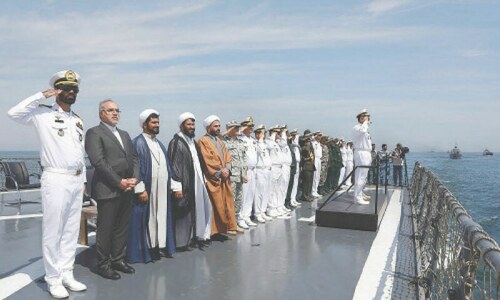ANANTNAG: Prime Minister Narendra Modi is criss-crossing India in a marathon election campaign but, for the first time since 1996, his Bharatiya Janata Party (BJP) is not contesting in held Kashmir.
Instead, the main contenders for the three seats in the Muslim-majority region are powerful local parties — the National Conference and Peoples Democratic Party (PDP). They will contest against each other, but both say they are opposed to the BJP and will align with the Congress party-led opposition alliance.
Analysts and opposition parties say the BJP decided to skip contesting the election because the outcome is likely to contradict Modi’s narrative of a peaceful, more integrated Kashmir since he removed the occupied region’s semi-autonomous status in 2019 and brought it under New Delhi’s control.
The BJP, along with allies, is contesting in every part of India and is tipped to win a majority of parliament’s 543 seats on the back of its Hindu-first image.
It is the first time since 1996 that BJP has opted not to contest elections in the disputed region
“Why are they absent from the election?” asked Omar Abdullah, a leader of the National Conference and a former chief minister of India-held Kashmir.
“Clearly there is a gap between what the BJP claims to have done and the reality on the ground,” he said, speaking at his home in Srinagar.
The Indian government slapped a harsh lockdown on held Kashmir following the 2019 decision and Abdullah, as well as almost all other local leaders, were held in custody for months.
Ravinder Raina, the chief of the BJP’s Kashmir unit, said the party’s decision to skip the election was part of a broader strategy, although he declined to give specifics.
“The BJP will not fight, but support a candidate who will work for peace, happiness, brotherhood and democracy,” in each of the three seats, he said.
The BJP has not yet announced which of the many small parties in the fray it will support.
Alienation, discontent
Interviews with over a dozen residents, political leaders, security officials and analysts in India-held Kashmir and New Delhi indicate that discontent and alienation continue to simmer in the heavily militarised region.
Abdul Hameed, a 50-year-old garment store owner in Pulwama town, said New Delhi had kept the lid on held Kashmir since 2019, masking the true situation.
“But it is like a spring. Right now they have crushed it. But who knows when will it burst open again,” he said.
Although there are fewer restrictions on people’s movements compared to five years ago, there are still tens of thousands of troops in the valley to enforce the peace.
For decades, residents and human rights groups have accused Indian forces of atrocities against the mainly Muslim population. The government says cases of abuse are isolated acts and it prosecutes any soldier found guilty of human rights violations.
“The absence of an elected system over here is an indication of the fact that things are not as they are portrayed,” said Sheikh Showkat Hussain, a retired law professor in Srinagar. “They (the BJP) should have treated (this election) as a referendum in their favour. But they seem to be scared.”
In the May 2019 general election, the BJP contested all three seats in held Kashmir, losing them to Abdullah’s National Conference.
This year, BJP is contesting the two seats in Jammu and one in Ladakh, all of which it had won in 2019.
Mehbooba Mufti, the chief of the PDP, is contesting from the Anantnag-Rajouri constituency, which many believed might have been the BJP’s best bet in this election.
Gerrymandering
In 2022, a New Delhi-appointed commission changed the borders of constituencies in occupied Kashmir and Jammu. To held Kashmir’s Anantnag, which had around 1.6 million largely Muslim votes in 2019, it added around one million mostly Hindu voters from Jammu’s Poonch and Rajouri districts.
Mehbooba Mufti told Reuters that by clubbing them, the Modi administration was “changing the balance of the voters”. The BJP, she said, wants to “disempower and divest, dispossess Muslims, especially the Kashmiris”.
National Conference’s Abdullah also claimed that the redrawing of the district was done to give the BJP an “advantage”.
But they still didn’t field a candidate, which “tells you just how bad things must be for the BJP”, Abdullah said.
However, BJP’s Raina said that the redrawing has made the constituencies more representative of the region.
Published in Dawn, May 10th, 2024














































